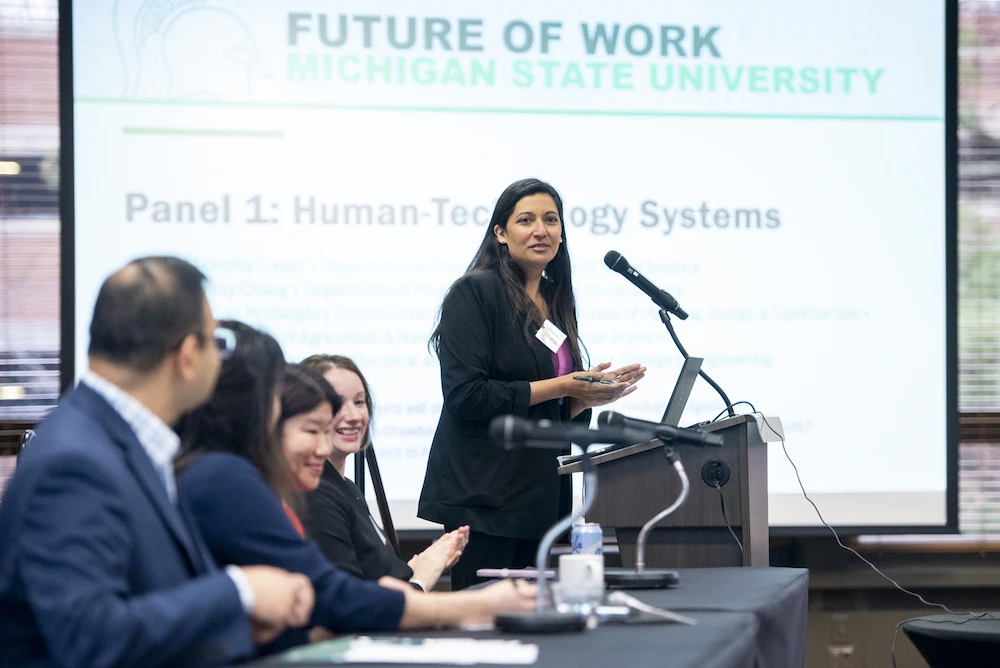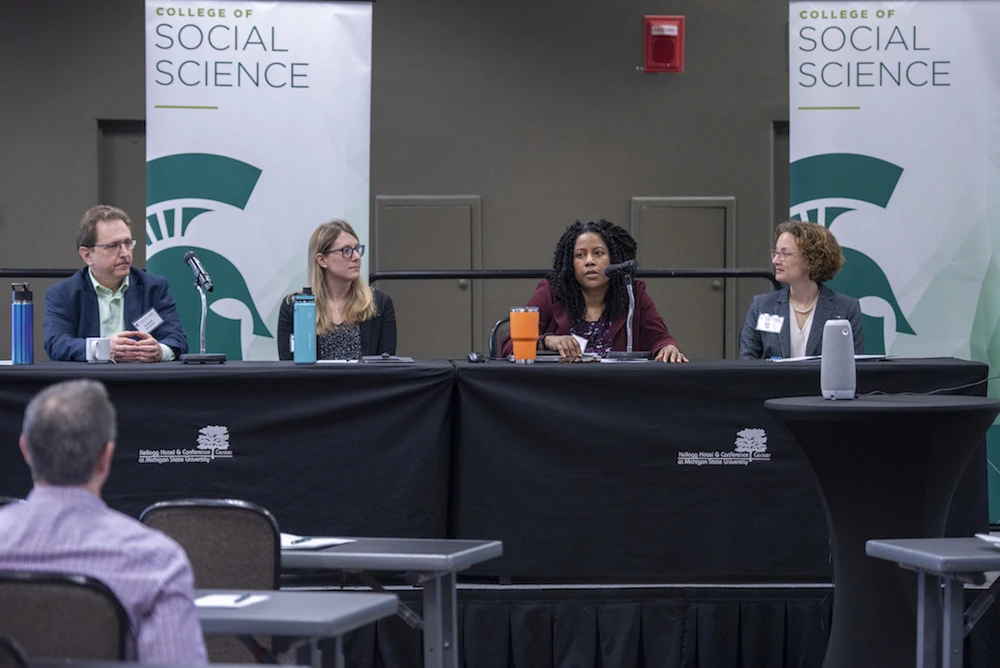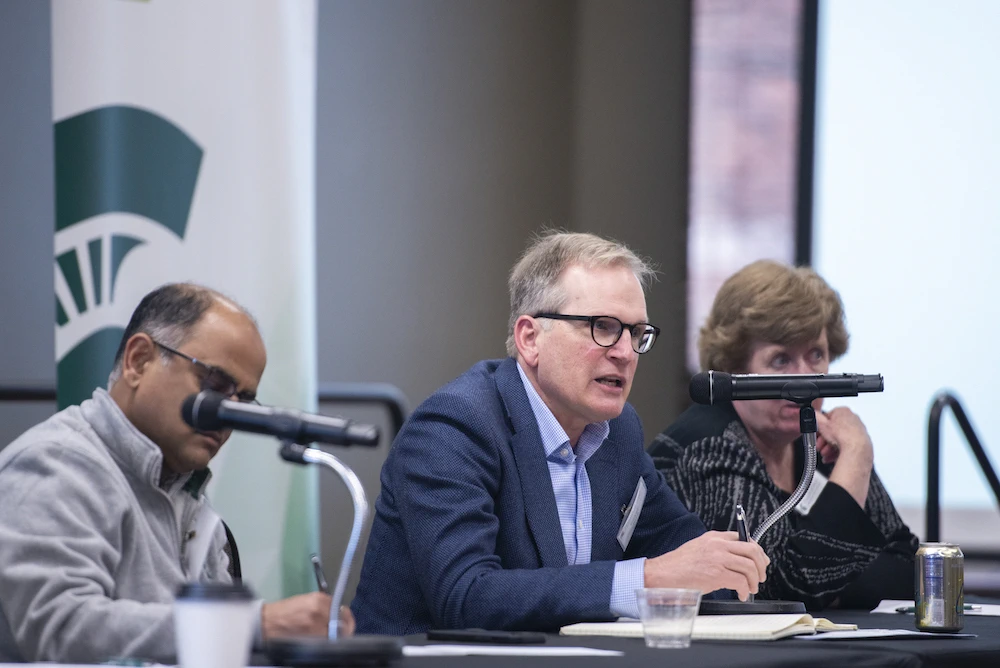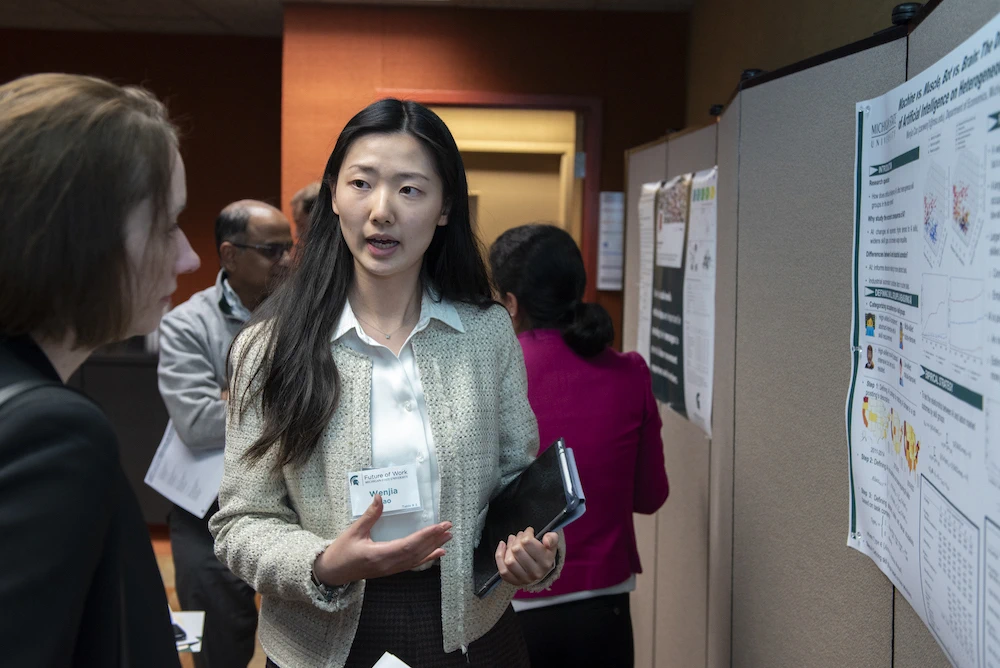MSU drives conversation, research on the future of work
March 13, 2024 - Jack Harrison
You have likely heard about ChatGPT, and you might even have the application downloaded on your phone. But have you thought about how technology — and artificial intelligence specifically — will impact your job and the future of work? Michigan State University’s College of Social Science launched the Future of Work initiative to answer this very complex question, starting by hosting the university’s first Future of Work Conference.
Faculty from across MSU colleges and representatives from community organizations came together to collaborate and engage on this subject. Expert-led interactive discussions centered on four topics, including human interaction with artificial intelligence, accessibility changes to technology, new skills in the labor market and government engagement. Additionally, graduate students presented their research on the future of work.
“These changes are affecting all of us. Emerging technologies are changing how we work, what work is needed and what skills are needed,” said Tara Behrend, the initiative’s director and John Richard Butler II Endowed Professor in the School of Human Resources and Labor Relations. “We will have new problems and we need to consider what that means, but we will never run out of solutions.”

The conference was on Friday, March 8, at the Kellogg Hotel and Conference Center on MSU’s campus.
The meaning behind the ‘future of work’
The “future of work” concept refers to all the different aspects of how work will change. It includes how technology is changing, especially the growth of artificial intelligence and how issues of surveillance are becoming more profound.
It also includes preparing for unemployment issues and considering additional risks. Since the COVID-19 pandemic, the nature of work has also changed, with more people working remotely, new skills increasing in importance and demographic shifts impacting organizations.
“This important initiative provides the opportunity for MSU to take a lead in meeting the changes of our future,” Interim Provost Thomas Jeitschko said. “I am pleased the College of Social Science is spearheading this work and engaging across disciplines including beyond the college.”
Brent Donnellan, dean of the College of Social Science, emphasized that preparing for the future of work is also a major part of the MSU 2030 Strategic Plan to be a leader in developing solutions to the challenges of the 21st century.
“Leading on this issue is also vital to cementing our role as the state of Michigan’s university in so many ways including advancing workforce development and helping organizations thrive in our state,” he said.

Interdisciplinary approach
The conference included panels with faculty experts from across six colleges, including from the College of Social Science, College of Law, College of Education, Broad College of Business, College of Agriculture and Natural Resources and College of Engineering.
MSU faculty spoke on the future of work through many disciplines, including organizational psychology, construction management, counseling and education, supply chain, engineering, economics and law, among others.
“When I think about the transformation of work, social scientists are well positioned to understand the future of work because we focus on human behavior from multiple perspectives,” Donnellan said. “It should bring together all the departments in the college and across the university because all disciplines play a role in understanding the coming changes and in educating our students.”
A sampling of the conference’s main themes included:
- Human interaction with artificial intelligence and automation
- People not pursuing postsecondary education
- New skills and training
- Accommodations and accessibility from new technology
- Diversity and equity in the workforce
- Changing demographics and an older workforce
Government engagement
The conference also focused on the importance of government regulation in response to technology’s ongoing evolution. It’s critical for higher education institutions to engage in seeking solutions, such as developing opportunities and programs that provide employee credentialing and training. Panelists also emphasized the need for engagement and partnership across all sectors, including with K-12 education, private corporations and nonprofits.
Michigan’s work force is aging, and the government must recognize what this trend means. From 2000 to 2020, the share of employed adults who were over 60 more than doubled, and this is expected to increase by 2030, according to Peter Berg, professor and director of the School of Human Resources and Labor Relations.

Discussion also included the issues and programs that the government needs to support. For example, to stabilize the workforce and support the future of work, individuals need to have access to affordable housing and childcare programs.
Voices of the future
Graduate students presented research on a variety of relevant topics that must be considered as the ways we work change and the type of work we do evolves, including:
- Identifying work values
- Gender bias and diversity in the workforce
- Anxiety and fatigue in the age of virtual work
- Pay transparency and job security
- Social media and unionization
The winner of the student presentations was economics doctoral student Wenjia Cao, who presented “Machine vs. Muscle, Bot vs. Brain: The Differential Effects of Artificial Intelligence on Heterogenous Skill Groups.”

Moving forward and preparing for change
A major call to action of the conference was to not run from technology but to embrace it. As artificial intelligence advances, many panelists urged the importance of finding ways to leverage this technology to assist in daily work and activities, rather than worry about it taking jobs away.
MSU’s Future of Work initiative is just getting started, but the work will be ongoing. Researchers are focused on developing new thinking frameworks and strategies, as well as engaging students on the changing nature of work.
In order to best prepare for the future, according to Behrend, “everyone needs to be at the table, and we need to pursue solutions as a community — and that is what this conference offered.”
All photos credit Jackie Hawthorne, College of Social Science visual communicator.
This story originally appeared in MSU Today here.

